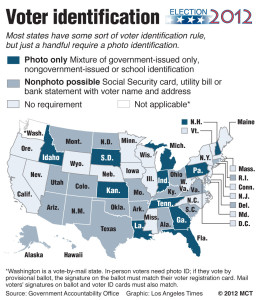Voter ID Laws: They’re Wrong, But Not For the Reasons You Might Think
 The right to vote has been treated as a right that is fundamental, even sacred, by citizens and Supreme Court justices alike. So what explains the estimated 1 million minority citizens who are expected to be disenfranchised by voter ID laws this November? An even better question: why are these laws legal? Have we taken a step back to the days of Jim Crow, black codes, and pre-women’s suffrage?
The right to vote has been treated as a right that is fundamental, even sacred, by citizens and Supreme Court justices alike. So what explains the estimated 1 million minority citizens who are expected to be disenfranchised by voter ID laws this November? An even better question: why are these laws legal? Have we taken a step back to the days of Jim Crow, black codes, and pre-women’s suffrage?
Well, not quite. But we may be entering an era where laws are passed for the wrong reasons and where hundreds of millions of dollars are spent on a problem that doesn’t really exist.
History and Constitutionality
The 2008 election saw a dramatic spike in the number of Hispanics and African-Americans who showed up at the polls, as well as people from lower on the socioeconomic spectrum —these are voter groups who traditionally vote as Democrats. Consequently, when Republicans took control of state legislatures in 2010, they set out to make sure what happened in the 2008 election could never happen again. The end result: An ingeniously engineered concept called “voter ID” which effectively targets poor, minority voters under the thin veil of “polling integrity”.
You would think that this would never fly in a country that prides itself on free and fair elections, but most voter ID laws have been upheld or partially upheld by state and federal courts. This means that despite Pennsylvania House Republican Leader Mike Turzai’s crass comment that “voter ID will allow Mitt Romney to win the state of Pennsylvania!”, and despite voter ID laws being the not-so-secret Trojan horse of the Republican Party, the courts have seen some legitimacy in these laws.
In general, the courts have accepted “preventing voter fraud” as a constitutional basis for these new laws and have upheld them as long as they contain three key provisions:
1. Voter IDs need to be provided free of charge.
This means completely free, through all stages of the process. Laws that require birth certificates or other forms of documentation as a prerequisite to getting a voter ID, such as the one that Missouri passed in 2006, have been enthusiastically struck down for being, in effect, poll taxes. States will not only have to subsidize the cost of millions of IDs but will also have to pay for the design and distribution of the new IDs.
2. Voter IDs need to be readily accessible to everyone.
States need to make it very easy for citizens to get their IDs. Significant steps will need to be taken to provide carpools to DMVs and mobile ID-issuing centers will need to be created to bring IDs to disabled or elderly citizens. Furthermore, state DMVs will have to work extended hours and even open new offices to accommodate increased demand for IDs.
3. There needs to be significant public outreach and education efforts to make everyone aware of the new requirements.
Georgia’s voter ID law was blocked for the second time in 2006 because of half-hearted outreach efforts. Paid PSAs were aired on radio stations and letters explaining new voting rules were mailed to citizens; however, these PSAs were run at off-peak hours on stations with low numbers of listeners and the letters did not reach the citizens who would most likely be affected by the new laws. The Supreme Court made clear that broad measures needed to be taken for a law to be upheld. These include brochures and websites, mailed postcards, advertisements on a variety of radio stations at peak times, coverage in the press, and phone calls to educate voters well in advance of elections.
The Cost to Us
None of this is free and estimates for the cost per state are in the millions. Missouri alone is expected to pay 6 million dollars for the first year in which its voter ID law is implemented, and 4 million every year after that. It should be noted that Missouri’s election expenditures totaled 10 million dollars last year, which means that next year we are looking at a 60 percent increase in election spending. This is a burden that will undoubtedly be transferred to taxpayers, which begs the question: are you willing to pay more taxes to sustain these laws?
Even more troubling is the fact that the constitutionality of these laws rests on contingencies—things that have not yet happened. There are currently 33 million Americans who do not have photo IDs. Even if states can provide free, ready photo IDs to 90 percent of these Americans, this still leaves 3 million Americans who will not be able to vote this election. Are we giving way to a slippery slope where we begin to enact laws based on empty promises?
Lastly, out of all the types of voter fraud, voter ID laws only prevent voter impersonation. The startling reality is, according to a News21 study, there have been only ten cases of voter impersonation since 2000.
Voter ID laws are a wildly exorbitant and potentially dangerous solution to a fictitious problem, and it is because of this, not just issues surrounding their constitutionality, that people should be demanding repeal.
1 Comment
Join the discussion and tell us your opinion.
There is only ONE reason to be against Voter ID……….and only ONE side that IS against it.